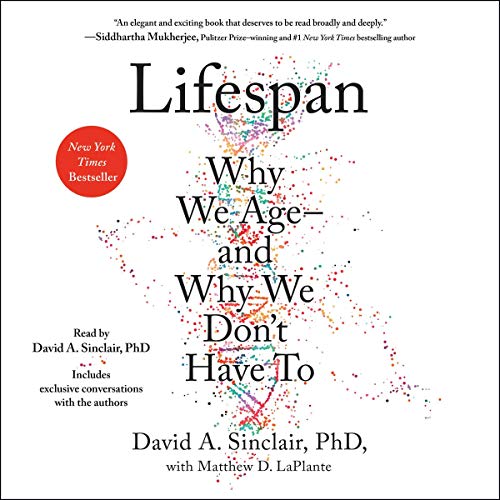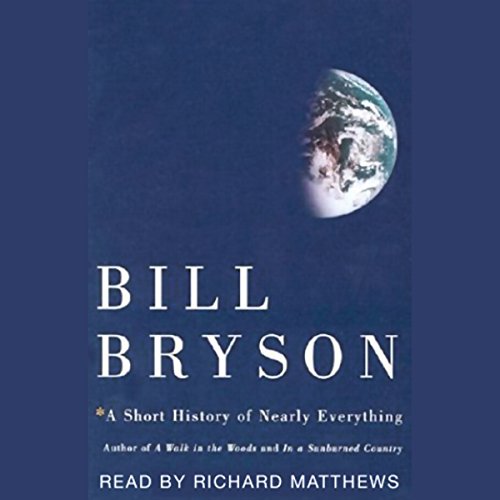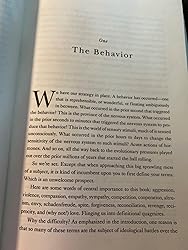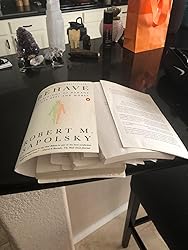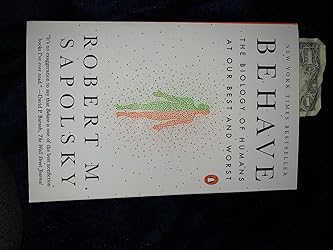
 Audible sample
Audible sample  Playing...
Playing... 
 Paused
Paused  Your audiobook is waiting!
Your audiobook is waiting!
Enjoy a free trial on us
$0.00$0.00
- Click above for unlimited listening to select audiobooks, Audible Originals, and podcasts.
- One credit a month to pick any title from our entire premium selection — yours to keep (you'll use your first credit now).
- You will get an email reminder before your trial ends.
- $14.95$14.95 a month after 30 days. Cancel online anytime.
Buy
-12% $23.63$23.63
Behave: The Biology of Humans at Our Best and Worst
 Audible Audiobook
– Unabridged
Audible Audiobook
– Unabridged
The New York Times best seller.
From the celebrated neurobiologist and primatologist, a landmark, genre-defining examination of human behavior, both good and bad, and an answer to the question: Why do we do the things we do?
Sapolsky's storytelling concept is delightful but it also has a powerful intrinsic logic: He starts by looking at the factors that bear on a person's reaction in the precise moment a behavior occurs, and then hops back in time from there, in stages, ultimately ending up at the deep history of our species and its evolutionary legacy.
And so the first category of explanation is the neurobiological one. A behavior occurs - whether an example of humans at our best, worst, or somewhere in between. What went on in a person's brain a second before the behavior happened? Then Sapolsky pulls out to a slightly larger field of vision, a little earlier in time: What sight, sound, or smell caused the nervous system to produce that behavior? And then, what hormones acted hours to days earlier to change how responsive that individual is to the stimuli that triggered the nervous system? By now he has increased our field of vision so that we are thinking about neurobiology and the sensory world of our environment and endocrinology in trying to explain what happened.
Sapolsky keeps going: How was that behavior influenced by structural changes in the nervous system over the preceding months, by that person's adolescence, childhood, fetal life, and then back to his or her genetic makeup? Finally, he expands the view to encompass factors larger than one individual. How did culture shape that individual's group, what ecological factors millennia old formed that culture? And on and on, back to evolutionary factors millions of years old.
The result is one of the most dazzling tours d'horizon of the science of human behavior ever attempted, a majestic synthesis that harvests cutting-edge research across a range of disciplines to provide a subtle and nuanced perspective on why we ultimately do the things we do...for good and for ill. Sapolsky builds on this understanding to wrestle with some of our deepest and thorniest questions relating to tribalism and xenophobia, hierarchy and competition, morality and free will, and war and peace. Wise, humane, often very funny, Behave is a towering achievement, powerfully humanizing, and downright heroic in its own right.
- Listening Length26 hours and 27 minutes
- Audible release dateMay 2, 2017
- LanguageEnglish
- ASINB06XVYHXDV
- VersionUnabridged
- Program TypeAudiobook
 Read & Listen
Read & Listen
Get the Audible audiobook for the reduced price of $9.00 after you buy the Kindle book.
People who viewed this also viewed
- Audible Audiobook
- Audible Audiobook
- Audible Audiobook
- Why Zebras Don't Get Ulcers: The Acclaimed Guide to Stress, Stress-Related Diseases, and Coping - Now Revised and Updated
 Audible Audiobook
Audible Audiobook - Audible Audiobook
People who bought this also bought
- Audible Audiobook
- Audible Audiobook
- Audible Audiobook
- Audible Audiobook
- Audible Audiobook
Related to this topic
- Audible Audiobook
- Audible Audiobook
- Audible Audiobook
- Audible Audiobook
- Audible Audiobook
Product details
| Listening Length | 26 hours and 27 minutes |
|---|---|
| Author | Robert Sapolsky |
| Narrator | Michael Goldstrom |
| Whispersync for Voice | Ready |
| Audible.com Release Date | May 02, 2017 |
| Publisher | Penguin Audio |
| Program Type | Audiobook |
| Version | Unabridged |
| Language | English |
| ASIN | B06XVYHXDV |
| Best Sellers Rank | #1,173 in Audible Books & Originals (See Top 100 in Audible Books & Originals) #1 in Criminology (Audible Books & Originals) #1 in Biology (Audible Books & Originals) #6 in Medical General Psychology |
Customer reviews
Customer Reviews, including Product Star Ratings help customers to learn more about the product and decide whether it is the right product for them.
To calculate the overall star rating and percentage breakdown by star, we don’t use a simple average. Instead, our system considers things like how recent a review is and if the reviewer bought the item on Amazon. It also analyzed reviews to verify trustworthiness.
Learn more how customers reviews work on AmazonReviews with images
-
Top reviews
Top reviews from the United States
There was a problem filtering reviews right now. Please try again later.
Behave is split into 17 chapters in which each chapter effectively thinks about behavior on a longer time scale, starting with immediately before to getting to evolutionary origin. The author starts by posing questions on how our behavior originates. The first 5 chapters highlight this point and the author discusses topics from how the neuroscience of decisions works to how our the neural architecture is laid through our experiences. There is a lot of technical material which can be tough to follow, but there is an appendix which helps clarify the subject for those less familiar. Nonetheless Chapter 2 discusses the various parts of the brain and aspects of their evolution and has a lot of detail but is a core reference chapter for later in the book. The author then starts getting into hormones and regulation and how they impact our actions, there is a lot of discussion of myths and facts and one gets a sense of how complex the interactions are. The author discusses the adolescent brain and how it is still very much in development. Ideas like how accountable are youths get's discussed, these kinds of questions are posed and re-discussed throughout. The author discusses how the environment can influence behavior and some epigenetic ideas are discussed along side general brain development. The author discusses the basis of our political nature as well, in particular how people categorize other people and have internal Us vs Them delineations. How we frame who is an us and who is a them though is extremely variable and our characterization of groups is deemed to be largely constructed rather than innate. The author discusses how different societies have different levels of social interactions and consequentially how different people think about interacting with strangers depends heavily on how much social capital their respective societies have. The author discusses hierarchies and brings in his primatology expertise and discusses how different ape families manage their hierarchies and stress associated with such systems. Human hierarchical systems are discussed in this contexts and the author highlights that our current capitalistic hierarchical society is all new relative to hunter gatherer systems. The author discusses our systems of morality and where they originate; the author looks at cases of high generosity and discusses what parts of the brain were involved. There are lots of interesting facts to be read in these chapters, really fascinating material. The author discusses things like empathy and sympathy and how too much empathy gets in the way of prudent action. It is the dispassionate observer who ends up being more helpful on average. The author revisits the criminal justice system and discusses the deep flaws in how we might be thinking of right and wrong and responsibility; there are useful ideas to consider when thinking about policy. The author ends up by discussing our propensity for violence and war overtime. There are some great anecdotal stories from recent world wars on reconciliation as well as front line behavior when people weren't considering the enemy a them.
Behave is a pretty remarkable book. It is a combination of material from so many subjects, all of which are non-trivial, and it is put together remarkably well. For those interested in how people can behave, where our behavior comes from, what time scales are involved in our propensities and how flexible our responses are this is a must read. One should get a sense of optimism from this, despite science's progress on understanding behavior, we are nowhere close to claiming we have strong causal mechanisms that took a person from point a to b. There are correlated variables and we have some indication on where propensities come from but one still has room for individualism in this book. Very informative, very impressive.
So many big topics are covered in this book! I've picked some themes that resonated with my current understanding of what it is to be human. These are represented by some scant notes of mine clearly labeled as [jch note:s]. All quoted text is verbatum from the book, with p.Page number.
Resonating Themes: It's complicated! (Addressing Nature v. Nurture), Us v. Them, Autopilot (Free Will?) Brain Science, Income Inequality, Moral Foundations, Culture
Sapolsky is a great writer! The text is clearly presented by someone with a firm grasp on the tree of knowledge and how to pass it on. There are many noted os a personal nature, usually with a wonderful sense of humor. And there are many, many wonderful references such as "untruthiness".
It's Complicated! - That's the theme of the book.
p.248 "This is summarized wonderfully by the neurobiologist Donald Hebb: “It is no more appropriate to say things like characteristic A is more influenced by nature than nurture than . . . to say that the area of a rectangle is more influenced by its length than its width.” It’s appropriate to figure out if lengths or widths explain more of the variability in a population of rectangles. But not in individual ones."
Epilogue Bullet: " Genes aren’t about inevitabilities; they’re about potentials and vulnerabilities. And they don’t determine anything on their own. Gene/ environment interactions are everywhere. Evolution is most consequential when altering regulation of genes, rather than genes themselves."
Epilogue Bullet: " Adolescence shows us that the most interesting part of the brain evolved to be shaped minimally by genes and maximally by experience; that’s how we learn—context, context, context."
Epilogue Bullet: " We are constantly being shaped by seemingly irrelevant stimuli, subliminal information, and internal forces we don’t know a thing about."
p.267 Figure from Cluture Gender and Math ( Luigi Guiso et al. ) showing girls better at math in Iceland
Epilogue Bullet: " Brains and cultures coevolve."
p.92 "Words have power. They can save, cure, uplift, devastate, deflate, and kill. And unconscious priming with words influences pro-and antisocial behaviors."
p.97 culture shapes what we see "Thus, culture literally shapes how and where you look at the world."
Us versus Them
Epilogue Bullet: " We implicitly divide the world into Us and Them, and prefer the former. We are easily manipulated, even subliminally and within seconds, as to who counts as each."
Epilogue Bullet: " Be dubious about someone who suggests that other types of people are like little crawly, infectious things."
p.388 IAT "Rapid, automatic biases against a Them can be demonstrated with the fiendishly clever Implicit Association Test (IAT). 3 Suppose you are unconsciously prejudiced against trolls. To simplify the IAT enormously: A computer screen flashes either pictures of humans or trolls or words with positive connotations (e.g., “honest”) or negative ones (“ deceitful”). Sometimes the rule is “If you see a human or a positive term, press the red button; if it’s a troll or a negative term, press the blue button.” And sometimes it’s “Human or negative term, press red; troll or positive term, press blue.” Because of your antitroll bias, pairing a troll with a positive term, or a human with a negative, is discordant and slightly distracting. Thus you pause for a few milliseconds before pressing a button."
p.629 "The core of that thought is Susan Fiske’s demonstration that automatic other-race-face amygdala responses can be undone when subjects think of that face as belonging to a person, not a Them. The ability to individuate even monolithic and deindividuated monsters can be remarkable."
Epilogue Bullet: " When humans invented socioeconomic status, they invented a way to subordinate like nothing that hierarchical primates had ever seen before."
p.144 "There’s wonderful context dependency to these effects. When a rat secretes tons of glucocorticoids because it’s terrified, dendrites atrophy in the hippocampus. However, if it secretes the same amount by voluntarily running on a running wheel, dendrites expand. Whether the amygdala is also activated seems to determine whether the hippocampus interprets the glucocorticoids as good or bad stress."
Sapolsky shares a thorough, science-backed explanation of how and why humans act how they act, and this text -- while quite long and academic -- is incredibly useful to professionals in a range of fields.
This was my "bible" when I worked as a product manager in consumer tech -- if you want to learn about feedback loops, motivation, competition, dopamine, and other factors / mechanics that help guide people towards doing what you want them to do, this is the text.
Practical utility aside, it's deeply interesting subject matter. It's a lengthy read, and not an all-in-one-sitting book, but I cannot praise this enough.





